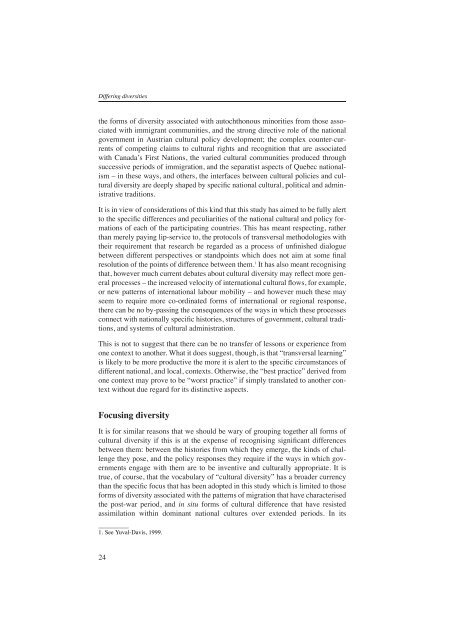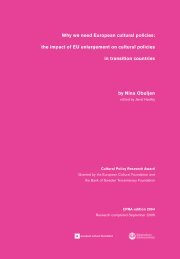Tony Bennett, Differing diversities - Council of Europe
Tony Bennett, Differing diversities - Council of Europe
Tony Bennett, Differing diversities - Council of Europe
Create successful ePaper yourself
Turn your PDF publications into a flip-book with our unique Google optimized e-Paper software.
<strong>Differing</strong> <strong>diversities</strong>the forms <strong>of</strong> diversity associated with autochthonous minorities from those associatedwith immigrant communities, and the strong directive role <strong>of</strong> the nationalgovernment in Austrian cultural policy development; the complex counter-currents<strong>of</strong> competing claims to cultural rights and recognition that are associatedwith Canada’s First Nations, the varied cultural communities produced throughsuccessive periods <strong>of</strong> immigration, and the separatist aspects <strong>of</strong> Quebec nationalism– in these ways, and others, the interfaces between cultural policies and culturaldiversity are deeply shaped by specific national cultural, political and administrativetraditions.It is in view <strong>of</strong> considerations <strong>of</strong> this kind that this study has aimed to be fully alertto the specific differences and peculiarities <strong>of</strong> the national cultural and policy formations<strong>of</strong> each <strong>of</strong> the participating countries. This has meant respecting, ratherthan merely paying lip-service to, the protocols <strong>of</strong> transversal methodologies withtheir requirement that research be regarded as a process <strong>of</strong> unfinished dialoguebetween different perspectives or standpoints which does not aim at some finalresolution <strong>of</strong> the points <strong>of</strong> difference between them. 1 It has also meant recognisingthat, however much current debates about cultural diversity may reflect more generalprocesses – the increased velocity <strong>of</strong> international cultural flows, for example,or new patterns <strong>of</strong> international labour mobility – and however much these mayseem to require more co-ordinated forms <strong>of</strong> international or regional response,there can be no by-passing the consequences <strong>of</strong> the ways in which these processesconnect with nationally specific histories, structures <strong>of</strong> government, cultural traditions,and systems <strong>of</strong> cultural administration.This is not to suggest that there can be no transfer <strong>of</strong> lessons or experience fromone context to another. What it does suggest, though, is that “transversal learning”is likely to be more productive the more it is alert to the specific circumstances <strong>of</strong>different national, and local, contexts. Otherwise, the “best practice” derived fromone context may prove to be “worst practice” if simply translated to another contextwithout due regard for its distinctive aspects.Focusing diversityIt is for similar reasons that we should be wary <strong>of</strong> grouping together all forms <strong>of</strong>cultural diversity if this is at the expense <strong>of</strong> recognising significant differencesbetween them: between the histories from which they emerge, the kinds <strong>of</strong> challengethey pose, and the policy responses they require if the ways in which governmentsengage with them are to be inventive and culturally appropriate. It istrue, <strong>of</strong> course, that the vocabulary <strong>of</strong> “cultural diversity” has a broader currencythan the specific focus that has been adopted in this study which is limited to thoseforms <strong>of</strong> diversity associated with the patterns <strong>of</strong> migration that have characterisedthe post-war period, and in situ forms <strong>of</strong> cultural difference that have resistedassimilation within dominant national cultures over extended periods. In its__________1. See Yuval-Davis, 1999.24














